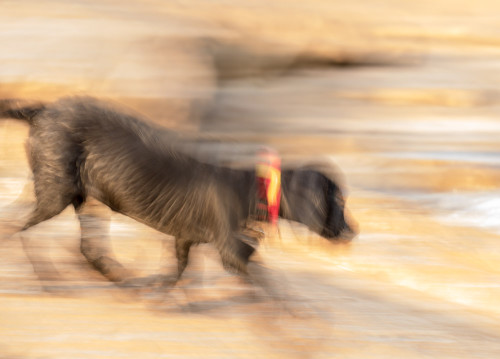
“The one absolutely unselfish friend that man can have……the one that never deserts him and the one that never proves ungrateful or treacherous is his dog” – George Graham Vest

Carbon, our Labrador puppy came into our lives as a bolt from blue. When I carried the two month old Labrador puppy back home soon after our Singapore trip, I never thought we get so attached to the her. A month of her interaction with us had transformed us. Her intelligence, faith and trusting nature stole all our hearts. She used to love water almost like fish. We affectionately called her four legged fish. Suddenly on day before yesterday, she developed generalized convulsions of unknown cause and left us forever. Here is a small tribute to her interaction with us. It was only a month she lived with us, and these few are the only memories I could preserve for ever.

Dogs touch our lives in so many different ways. And I think it can be firmly stated that a dog truly is every man (woman & child’s) best friend. Scientists have found that dogs and owners experience surges in oxytocin, a hormone responsible for maternal caring, when they look into each other’s eyes. The same hormone has been shown to spike in mothers’ brains when they look into their children’s eyes. The physiological response drives maternal caring and strengthens the bond between mothers and their babies.

The latest finding published in Science, Oxytocin-gaze positive loop and the coevolution of human-dog bonds suggests that dogs have tapped into this ancient biological mechanism, and through it reinforced the ties that have existed between humans and dogs since the animals were first domesticated thousands of years ago. “This might be why the human-dog relationship seems to work so well,” Takefumi Kikusui at Azabu University.

To investigate how dogs and humans formed their special relationship, Kikusui’s team ran a series of experiments. They began by watching 30 owners play with their dogs for half an hour. The breeds included golden retrievers, poodles, a Jack Russell terrier, a German shepherd dog, and several miniature schnauzers. The group was an even split of males and females.

Urine tests before and after the session revealed that oxytocin levels spiked in people whose dogs stared at them the most. But their dogs experienced a similar effect, with their own oxytocin rising too. When the scientists repeated the experiment with hand-raised wolves, the effect was nowhere to be seen.

They went on to perform a further experiment. This time, the researchers sprayed either salt solution or a dose of oxytocin up the dogs’ noses before watching them in a room with their owners. Dogs that had received the hormone boost stared for longer at their owners, though the effect only stood out in females. Again, tests on the owners found that the longer their dogs gazed at them, the higher their oxytocin levels rose. Why the effect was so vivid in females, but not in males, will become the focus of future research.

In an article accompanying the former study, Dogs hijack the human bonding pathway Evan MacLean and Brian Hare of the Duke Canine Cognition Center wrote that the results could have larger implications. “In addition to providing clues about how dogs became a part of human history, the results also help elucidate the proximate mechanisms through which our relationships with dogs may be salubrious,” they wrote. “An important future challenge will be to probe the extent to which these findings generalize to diverse populations.”

Another study published in PLOS One last year (Patterns of Brain Activation when Mothers View Their Own Child and Dog: An fMRI Study) found that inter-species parenting (or “alloparenting”) can be very similar to parenting your own baby, with brain regions associated with emotion, reward, affiliation and social cognition lighting up in similar ways when women looked at pictures of their children and their dogs.

In this study, researchers from Massachusetts General Hospital sought to directly compare the “functional neuro-anatomy of the human-pet bond with that of the maternal-child bond.” To do so, they had women look at photos of their babies and their dogs, as well as babies and dogs that they didn’t know.

“There was a common network of brain regions involved in emotion, reward, affiliation, visual processing and social cognition when mothers viewed images of both their child and dog,” reads the study. The unfamiliar photos didn’t provoke the same reaction.

Pets hold a special place in many people’s hearts and lives, and there is compelling evidence from clinical and laboratory studies that interacting with pets can be beneficial to the physical, social and emotional wellbeing of humans. Several previous studies have found that levels of neurohormones like oxytocin – which is involved in pair-bonding and maternal attachment – rise after interaction with pets, and new brain imaging technologies are helping us begin to understand the neurobiological basis of the relationship, which is exciting.




Carbon stole our hearts just by the power of the pictures you shared Krishi. I can only imagine how much she would have meant to your family. I can never understand why good things come to an end so fast.
Never heard of this anywr else = generalised convulsions
Very very unfortunate to lose to her soo fast
I physically pamper dog a lot …
They are just like human babies
Never heard of this anywr else = generalised convulsions in dogs
Very very unfortunate to lose her soo fast
I physically pamper dog a lot …
They are just like human babies
Very touche’ article on bonding..doctor
Was shocked to read her early separation from your lives..perhaps the sole purpose of Carbon was to impress upon the trusting nature and faith..